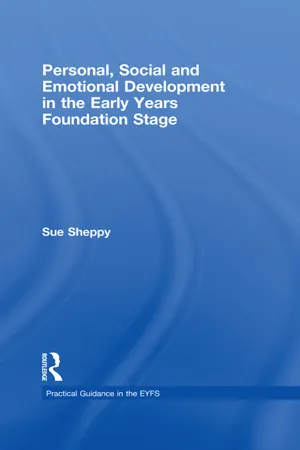
Personal, Social and Emotional Development in the Early Years Foundation Stage
- 184 pages
- English
- ePUB (mobile friendly)
- Available on iOS & Android
Personal, Social and Emotional Development in the Early Years Foundation Stage
About This Book
The Practical Guidance in the Early Years Foundation Stage series will assist practitioners in the smooth and successful implementation of the Early Years Foundation Stage.
Each book gives clear and detailed explanations of each aspect of Learning and Development and encourages readers to consider each area within its broadest context to expand and develop their own knowledge and good practice.
Practical ideas and activities for all age groups are offered along with a wealth of expertise of how elements from the practice guidance can be implemented within all early years settings. The books include suggestions for the innovative use of everyday ressources, popular books and stories.
Using the clear and accessible material in this book practitioners will be guided through the process of helping children develop an understanding of themselves; to help them gain independence and to become excited and motivated about their learning. Practical examples and ideas are linked to the Practice Guidance to ensure that practitioners feel confident in their ability to support and develop children's emotional well-being and social skills as well as develop their own knowledge and understanding of this important aspect of the EYFS.
Frequently asked questions
Information




















Table of contents
- Cover
- Title
- Copyright
- Dedication
- Contents
- Acknowledgements
- Introduction
- 1 Dispositions and attitudes: stories and activities
- 2 Self-confidence and self-esteem: stories and activities
- 3 Making relationships: stories and activities
- 4 Behaviour and self-control: stories and activities
- 5 Self-care: stories and activities
- 6 Sense of community: stories and activities
- Further recommended reading